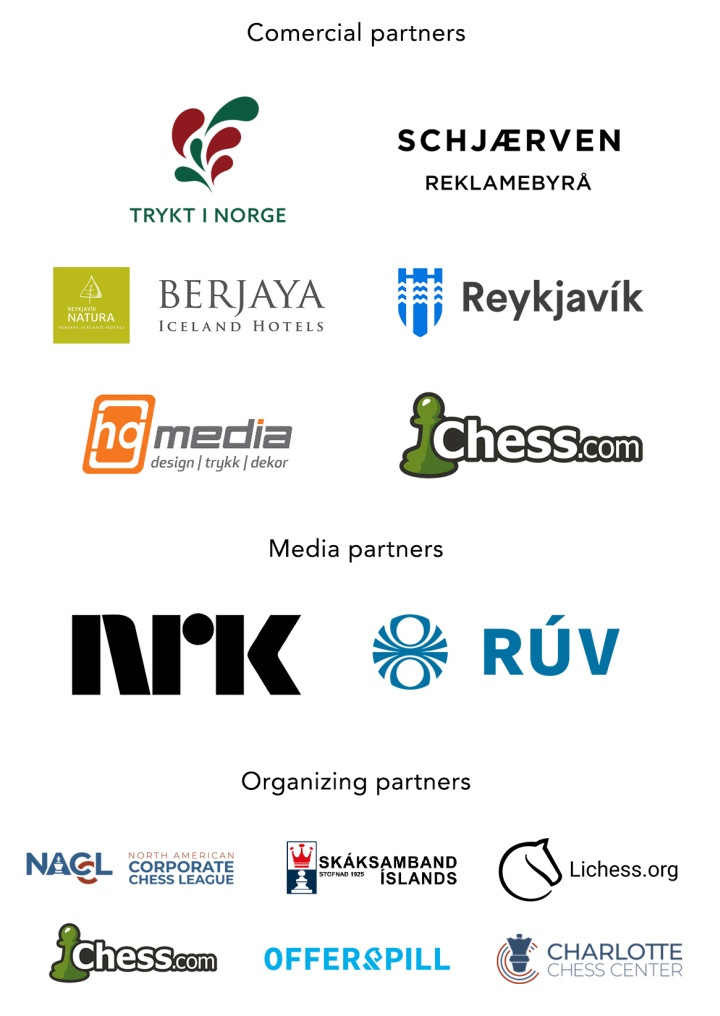US Chess Grandmaster Hikaru Nakamura gained his first world title, winning the FIDE World Fischer Random Chess Championship today in Reykjavik, Iceland. He defeated Ian Nepomniachtchi, the previous and current challenger for the classical chess world title, winning in a nail-biting “Armageddon” playoff game after their match ended 2-2.
The event was hosted by Iceland to commemorate the legendary chess match in Reykjavik where Bobby Fischer wrested the world champion title from Boris Spassky. The 1972 match was viewed as a Cold War battle between the turbulent American loner Fischer, and the traditionally dominant chess power of the Soviet Union.
Ready for battle
A very Fischer Random kind of daily routine has settled over the players, reflecting both the game and the format of the event. Magnus Carlsen’s towering second, Danish Grandmaster Peter Heine Nielsen, is always the first to arrive for the security check and unveiling of the start position. Carlsen will almost always appear last, breathless and bushy-haired.
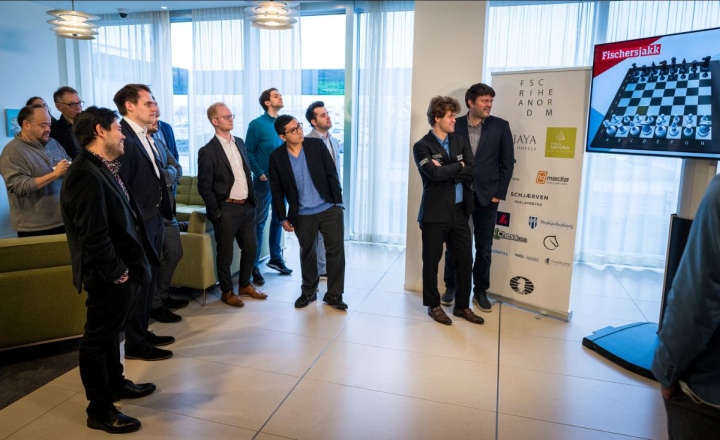
The organizers check their watches as the field and assistants gradually turn up, wondering if there is any gamesmanship in trying to be as close to late as possible. Unlike a traditional chess event, where opening preparation is laborious and top-secret, here, the players regularly kill down time by discussing previous games and wondering about the subtleties of play from as early as the first move.
The philosophical discussions between professed Fischer Random lover Vladimir Fedoseev and Heine Nielsen would likely never take place in a classical chess setting and never before a serious game. Here, the fresh appeal of unexplored random territory has swept aside such obstacles.
First battlefield
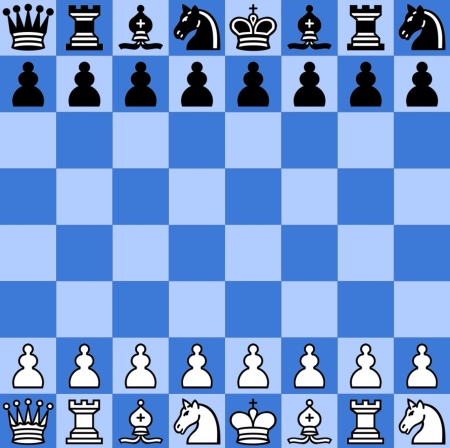
Start position for mini-match one
The final day’s matches will be best-of-four and decide each pair of final standings. Hikaru Nakamura chooses a pawn from Chief Arbiter Omar Salama’s outstretched fists and will play with the black pieces in games 1 and 4. His choice also determines the color sequence in all matches, with all higher-rated players – according to FIDE’s September 2022 Rapid Chess rating list – following his pattern.
The pairings will therefore start:
World Championship Title Final: Ian Nepomniachtchi – Hikaru Nakamura
3-4 play-off: Nodirbek Abdusattorov – Magnus Carlsen
5-6 playoff: Vladimir Fedoseev – Wesley So
7-8 play-off: Hjorvar Steinn Gretarsson – Matthias Blübaum
Carlsen tells Norwegian TV that the start position looks ‘fairly normal’, except for the odd corners. Icelandic Grandmaster Helgi Olafsson, here as Hjorvar Steinn Gretarsson’s assistant, has a more concrete reaction: “The b-pawn will be popular!” referring to the initial move that liberates the most pieces. After this, the players scramble to their preparation area, to try and work out some basic ideas for both sides of the position.
Artistic echo
The first move of the final session is made by noted Norwegian photographer Dag Alveng, who has a historical link to the event. The unofficial title match between Nakamura and Carlsen to revive Fischer Random was held in Norway in 2018, with an Alveng exhibition of photos as the backdrop for the event, held at the Henie Onstad Art Center.
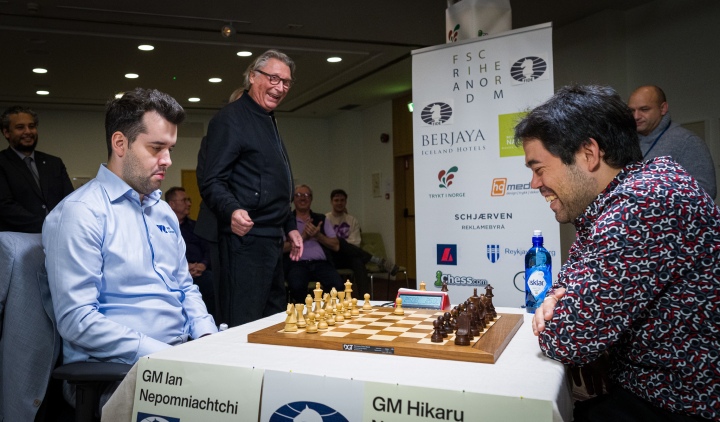
When play began, the games reflected both verbal predictions – the b-pawn was indeed popular, and the games were more sedate and ‘classical’ than the random violence that has often appeared earlier in the event. The title match was the first to come to the boil, with both of the candidates fond of aggression and risk.
Title duel
Nakamura’s long experience with Fischer Random appears to give him greater flexibility: he seems to have a fine sense of acceptable risk, even in the often bizarre settings the opening position can provide. Nepomniachtchi played uncharacteristically slowly and was soon embroiled in dangerous complications, which Nakamura handled much better.
After the game, Nakamura said: “Obviously, it’s nice to win in the first game, but more than that, it was good to just play a simple position, most of the (start) positions we’ve been getting have been pretty difficult… Overall it felt very smooth.”
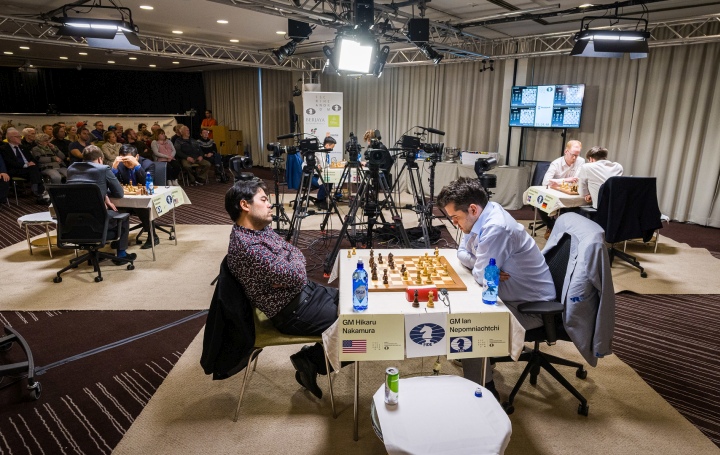
Nepomniachtchi visibly chose to chase the second game, breaking with a mirrored scheme of development to launch an attack that counted on confusion to make up for objective correctness. Nakamura navigated the complications well, and chose to repeat the position and split the point even though he could have tried for more by risking more adventures in the firing line. Preserving his lead took top priority.
Bronze drama
The course of the first Abdusattorov – Carlsen game was nothing short of baffling. The Norwegian classical world champion was producing a patented technical grind, steadily increasing a positional advantage and having a big edge on the clock, with Abdusattorov’s time running down to zero. Then, in quick succession, Carlsen missed a probably winning blow, walked his king into tactical danger, and finally shed all of his remaining pieces to complete a remarkable fourth, wobbly loss in a row.
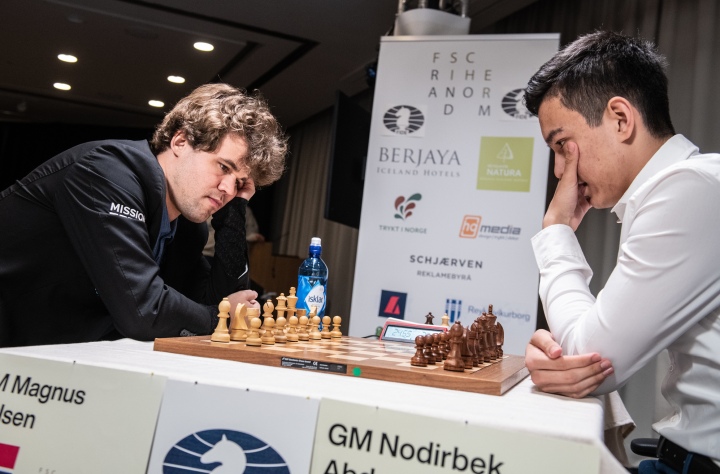
After resigning, Carlsen tried to reset the pieces on the board, looked confused – since the start position here isn’t so easy to remember – then just shook his head with a sad grin on his face and left the playing room. Abdusattorov told Norwegian TV that Carlsen is clearly not in good shape here, but … there were three games still to play.
The return fixture ended in revenge for the Norwegian, but only after a nervy back-and-forth struggle where both players were given chances to get the upper hand.
So – Fedoseev
This heavyweight battle had the air of very safe and solid games from position one, with balanced material, calm manoeuvring and gradual simplification – result: two evenly fought and solid draws.
Blübaum – Gretarsson
Blübaum took the lead after his Icelandic opponent blundered badly in what had been a fairly balanced game. The return game was a very solid affair, which ended in a draw, despite prolonged efforts.
The final battlefield?
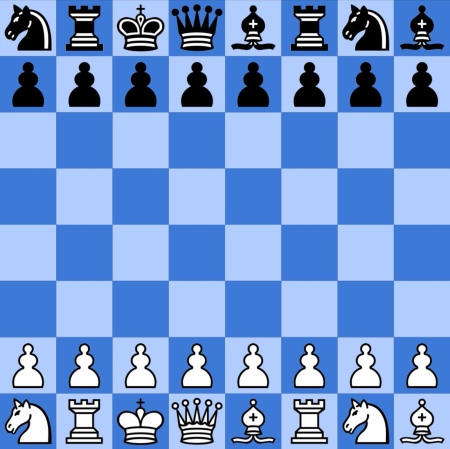
Starting position two
By now, there was no surprise when heads began to shake as the pieces landed on the demo screen. “Every time you have a knight in the corner, it’s annoying. But that’s how it goes,” Nakamura said, while his colleagues around him agreed. The next 15 minutes would be spent in pre-match preparation.
The fourth game of the day would be opened by another historic chess figure, Lilja Grétarsdóttir, former President of the Icelandic Chess Federation (2002-2008) and 11 times Icelandic Women’s Champion. She was the first person to bring a very young Magnus Carlsen to Iceland for a big international event, where he played against Garry Kasparov in a memorable first meeting.
Title at stake
Nakamura would start the final mini-match playing white. He suddenly found himself in grave danger when he wasted a bit of time to achieve what looked like an attractive chess position, but where he had delayed getting his king to safety a bit too long.
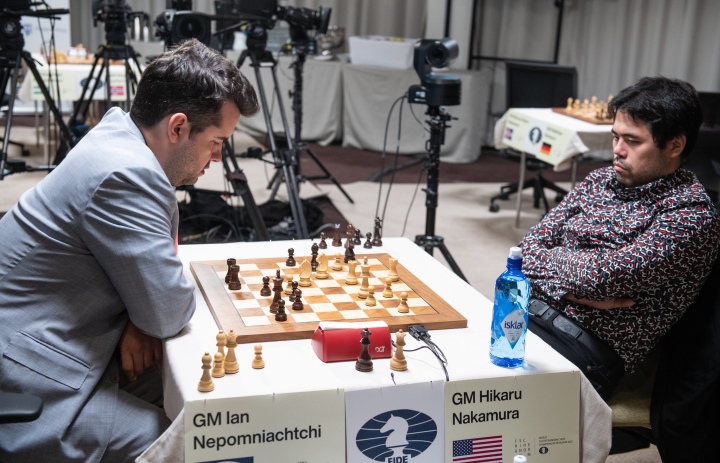
The ever-aggressive Nepomniachtchi was happy to oblige and sacrificed material to start opening lines towards the American’s king. The defensive challenge was too much for the event’s immovable object, and with his time dwindling, Nakamura succumbed to the pressure, losing his first game in the event at the worst possible moment.
Their fourth game startled spectators and commentators when it suddenly ended in an early draw. Nakamura felt he could have played on but got the impression that neither player was very satisfied with their own position.
This raises an interesting discussion about whether the players are showing weaker or stronger nerves by laying down arms now in order to decide a world title by Armageddon – a single game where White gets 15 minutes, but Black will have draw odds – White loses unless he wins. The players will make hidden bids to try and get the black pieces, the one who bids the lowest number gets that number of minutes against White’s 15.
World Champion forged in Armageddon
The bidding for time and color took place before the position was unveiled, so the players could not factor it in. The strategy followed was the one Carlsen indicated he would use, bidding high because time was more important with the lower degree of control in Fischer Random. Nepomniachtchi won the right to play black and have draw odds, having bid 13 minutes, Naka choosing 14.
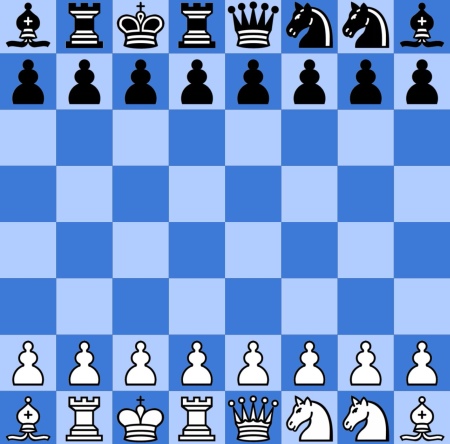
Position for the Armageddon game
Then the position arrived, which got the curt assessment of ‘interesting’ from Nakamura:
Now the players would only have a scant five minutes to think about their strategy. The players both had a few hurried moments of thought in different corners of the playing area. Nakamura had a brief chat with his compatriot So, who has been a regular discussion partner since they did not meet at the event. Nepomniachtchi had a quiet conversation with his assistant, Grandmaster Nikita Vitiugov.
While one can never be sure from watching a game unfold, the nervous tension must have been shared by the players as much as the audience. The sheer pace of the game, with both players reeling off impulsive moves from the very beginning with little thought, hinted that they were playing on nerves and adrenaline.
Nepomniachtchi missed one chance to land a surprising hidden blow that might have been spotted if keeping a healthy amount of time on the clock had not been a priority. He had the practical advantage of a solid position and only needing a draw, so a pragmatic rather than scientific approach to the game did make sense.
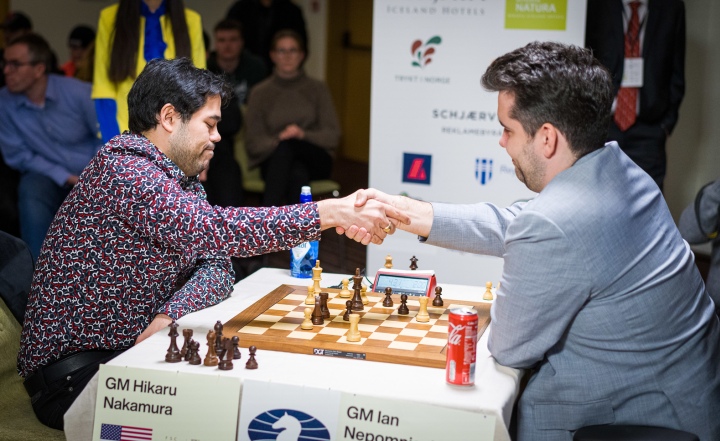
The decision of when to start thinking hard came too late, though for Nepomniachtchi, with Nakamura managing first to create activity and then to win material. Once he had the advantage, he was again back to his ruthless and efficient self, and Nakamura clinched his first world title.
Asked by Norwegian TV how it felt to finally get the things he was trying not to care too much about – a world title and a big payday – he said: “Yeah, it’s nice! I kind of wish it had been smoother … but I’m glad that I prevailed. I thought a bit about 1972 (the Fischer-Spassky match in Reykjavik) last night. There’s some irony, I guess the gods have a sense of humor.”
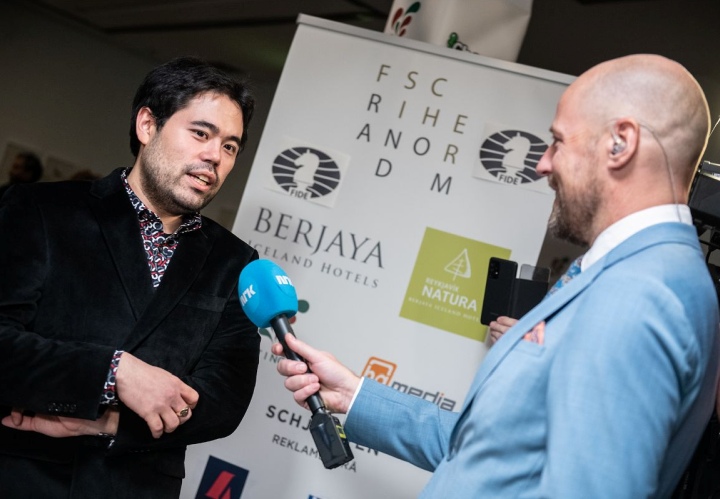
Battle for bronze
Reigning world champion Carlsen continued his comeback against reigning world rapid chess champion Abdusattorov with one of his best efforts of the event, forcing his opponent’s king on the run with some creative opening play, and accumulating various advantages during its flight. A controlled victory left Abdusattorov needing a win to reach an Armageddon tie-break.
Carlsen clinched the bronze spot with another controlled performance in the final game, keeping danger to an absolute minimum and winning a smooth technical game after frustrating his opponent. Carlsen was only partly cheered by this result, saying, “I think he was also a bit empty after yesterday’s disappointment.”
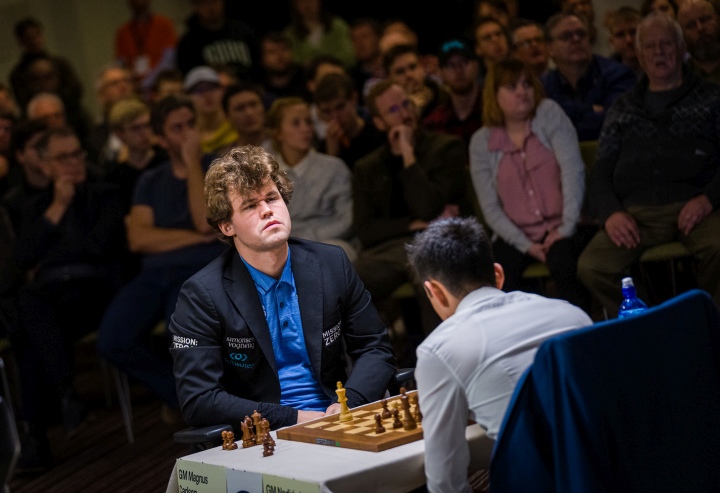
The remaining spots
Outgoing Fischer Random champion So fell behind in a very exciting duel with fellow Fischer Random fan Fedoseev. The critical factor was which exposed king was in greater danger, and Fedoseev’s judgement turned out to be sounder. So’s depressing event continued in game four, with him being unable to mount a comeback and instead losing after another powerful performance from Fedoseev.
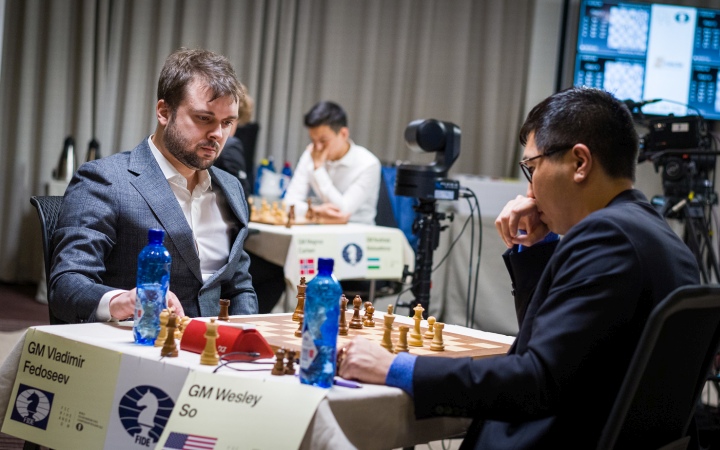
The final game of round 3 was Blübaum – Gretarsson, where the local Grandmaster came very close to evening the match against his German opponent. Blübaum had to endure extremely prolonged pressure and escaped with a draw through a combination of tenacity and gradually expiring thinking time. This match ended like all the non-title bouts, in a convincing 3-1 result when Blübaum came out on top after another closely balanced struggle was decided in a lengthy and rushed endgame.
Facts:
The final match results were (best of 4 games):
World Championship Title Final: Hikaru Nakamura – Ian Nepomniachtchi 2-2
Nakamura won the Armageddon playoff with the white pieces, 15-13 clock times.
3-4 play-off: Magnus Carlsen – Nodirbek Abdusattorov 3-1
5-6 playoff: Wesley So – Vladimir Fedoseev 1-3
7-8 play-off: Matthias Blübaum – Hjorvar Steinn Gretarsson 3-1
Prize fund: USD 400,000
1. $150,000 2. $85,000 3. $55,000 4. $40,000 5. $25,000 6. $20,000 7. $15,000 8. $10,000
Text: GM Jonathan Tisdall
Photo: David Llada and Lennart Ootes
Official website: fischerrandom.fide.com
